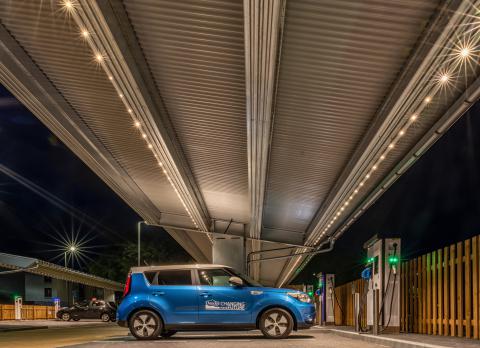In 2018, Dundee City Council built the UK's first purpose-built electric vehicle charging hub to encourage the uptake of e-mobility.

Dundee City Council - Drive Dundee Electric
Go To WebsiteAddressed Challenges:
- Air pollution
- Carbon emissions
- Tech & Innovation
Action Areas:
- Transport
- Built Environment
Initiative Purpose:
- Adaptation & Mitigation
The Story

Transport constitutes for 25% of the emissions in Dundee and is therefore central to achieving the emissions reduction target set out by the Dundee Climate Action Plan. This would involve widespread reform of the transport sector within the city. As part of the reform, the uptake of electric vehicles and electric vehicle infrastructure has been identified as key to long-term decarbonisation.
One of the main driving forces for the reform of Dundee’s transport sector is air quality. Dundee currently has an Air Quality Action Management Area covering the whole of the local authority area due to high levels of pollution in the city. Therefore, reforming the city’s transport towards greener alternatives is not only part of the council’s mitigatory action against climate change but looks to safeguard the health of Dundee residents into the future.
Princes Street Charging Hub was opened in the summer of 2018 and was the UK’s first purpose-built electric vehicle charging hub, featuring 18 bays of solar canopies, rapid charging units and an integrated energy storage system utilising second-life EV batteries. The was the first of six charging hubs within the city, which look to bring down emission levels and encourage residents to transition to cleaner forms of transport.
Success & Outcomes
This hub consists of 6 x 50kw and 4 x 22kw charging units. Renewable energy optimization ensures the best use of the on-site photovoltaic (PV) which provides 36kw of power with the battery renewable solution allowing 90kWh storage capacity.
The site delivered 24,000 charging session in its first year of opening and is future proofed to allow increased battery storage capacity and more powerful chargers.
Advice for others looking to do something similar
This project experienced both challenges and successes along the way. The key aspects to consider when embarking on a project such as this include:
- Land ownership
- Energy Capacity
- Use of renewable energy sources
- Location of site
- High costs
- Large timescales
- Communicating with the public / changing behaviours
